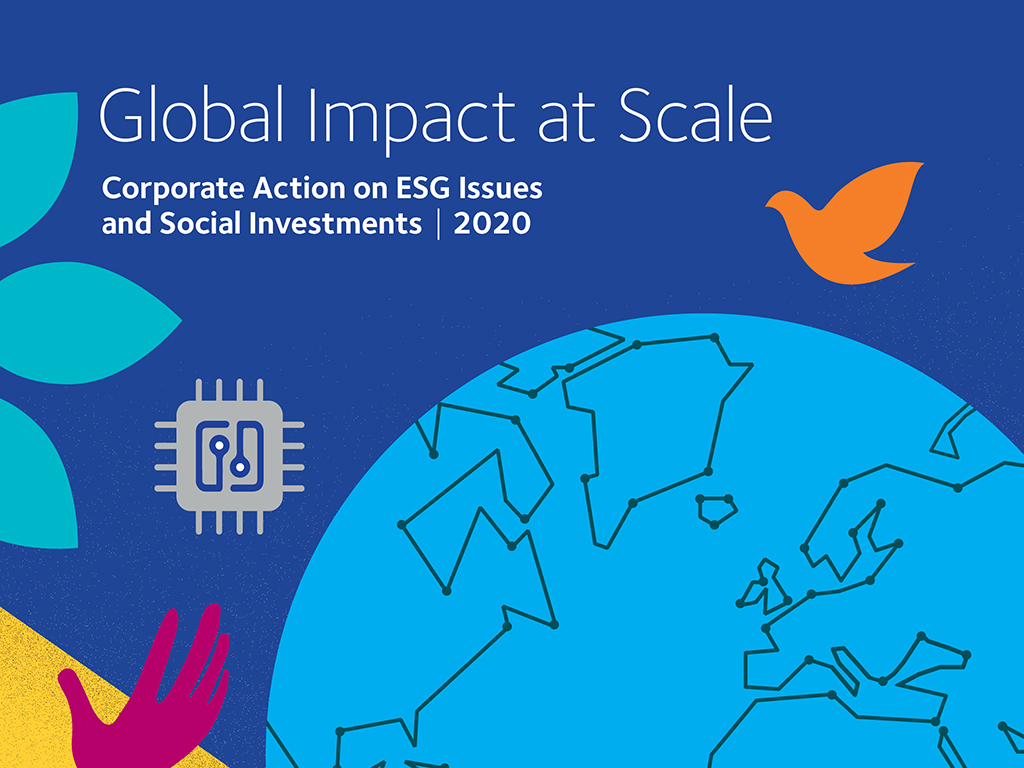Chief Executives for Corporate Purpose© (CECP), in collaboration with its Global Exchange (GX) Country Partners, has released the inaugural Global Impact at Scale: 2020 Edition report in 18 countries around the world. The report marks a new dawn for advocates and practitioners of Environmental, Social, and Corporate Governance (ESG). Informed by data collected for the year 2019, Global Impact at Scale: 2020 Edition provides insights into how companies integrate ESG in their internal strategies and how they strive to have even more positive impact beyond their physical offices and boardrooms as well. The detailed, cross-country data presented here offers a one-of-a-kind opportunity to compare and contrast how companies headquartered around the world are measuring and reporting on their ESG endeavors and investments. Here is what we found:
Importance of SDGs and Partnerships
The report underscores the growing influence that the United Nations’ 17 Sustainable Development Goals (SDGs) and private sector partnerships are having on companies’ societal strategies. The findings demonstrate that 81% of companies are acting on the SDGs, including using them frequently as a framework for reporting and/or integrating them into company strategy. The data also attest to the increasing value of private-sector partnerships as a strategy for advancing social investment work within companies. 59% of companies consider private-sector partnerships sufficiently important to be included in reporting to their CEO/senior executives. Private-sector partnerships are a vehicle that translates into a unique collaboration exercise that can bring together a broader set of skills, talents, and experience as well as innovative and creative ways to solve societal problems.
Responding to Major Issues
When presented with a list of focus areas, Global Exchange partners identified Diversity and Inclusion, Healthy Lifestyles, Future of Work, Human Rights, and Culture and Arts as the most important such areas at the global level. Overall, 70% of companies saw either an increase or steadiness in the resources allocated to all focus areas, with 5% citing an increase in resources for all five of the focus areas listed above. Healthy Lifestyles and Future of Work stand out as areas for which the most companies cited an increase in dedicated resources (61% of companies cited increases in both areas), followed by Diversity and Inclusion (59% of companies). Half of the companies reported a steady level of resources dedicated to Human Rights and Culture and Arts. Companies are reporting minimal declines in the number of resources allocated to the four areas selected for analysis. Only 2% reported a decline in resources for Future of Work, 1% for Human Rights, and 6% for Culture and Arts. No company reported a decline in the number of resources for Diversity and Inclusion or Healthy Lifestyles.
Reporting
Mandatory non-financial reporting in Africa, Europe, and Asia, combined with a growing reliance on ratings and rankings around the globe, attests to how external influences on corporate reporting are gaining force. Seven out of 10 companies are expanding their ESG reporting, while only 2% of companies indicated having no type of ESG reporting. The report also highlights specific global examples in relation to ESG regulation and reporting standards. These include insights into how Germany’s National Action Plan for Business and Human Rights was to be adopted by German corporations by 2020, the fact that Guidance on the Task Force on Climate-Related Financial Disclosures (TCFD) was announced in July 2020 in Japan and over 300 Japanese companies indicated their intention to follow it, how the Canadian Business Corporations Act now requires corporations to report on diversity at senior levels amongst other examples.
Teams, Organizations, and Service
The report finds that companies report that ESG strategy will be permeating higher seniority levels. The majority of companies (59%) predicted ESG strategy will be moving to more senior levels over the next two years. The attention employees pay to stakeholder capitalism is happening on all levels, from front-line workers up to the CEO, pushing companies to listen increasingly to internal stakeholders. Empowered employees have also led the way in applying pressure on high-level executives to take a stand on prominent political and social issues. A large majority of companies, 7 out of 10, disclosed ESG metrics as being integrated into performance (and remuneration) indicators for many or some staff company-wide.
According to the present research, in 2019 companies offered employees a median of 16 hours annually for volunteer service. A majority of companies (52%) offered at least one program matching-gift program and across all industries, the average participation rate in matching-gift programs was 26%, with a spread from 10% (Consumer Staples) to 35% (Energy).
Budget Trends for Greater Impact
The research revealed a trend toward the integration of ESG across business units. A majority of companies are increasing ESG resources across the board, and a vast majority are expressing a commitment to increasing resources on environmental issues in particular. Sixty-eight percent of companies reported that “S”-related resources were on the rise, and an overwhelming 85% of companies reported that “E”-related resources. Globally, no company reported a decline in either “S”- or “E”-related resources.
Notably, this first edition of Global Impact at Scale: 2020 Edition reflects ESG trends from before humanity was beset with the unprecedented global health and economic crisis of COVID-19. And yet, if anything, the report is even more relevant and indeed urgent as a result. Its data and insights provide us with a comprehensive snapshot of where companies stood on ESG just before the pandemic—and will enable us in subsequent editions to measure precisely how the pandemic has changed how resources are deployed and how companies view their societal roles and responsibilities going forward.
We are deeply grateful to the Global Exchange partners whose efforts to distribute the questionnaire and collect responses during the especially challenging year of 2020 made this debut issue of Global Impact at Scale possible. Global Exchange Country Partners encompass more than 800 companies and countries that represent 73% of the world’s GDP and 55% of its population. The partners include: Business in the Community in the U.K., CECP in the U.S., Cemefi in Mexico, Comunitas in Brazil, The Conference Board of Canada in Canada, CSRone Reporting in Taiwan, CSR Turkey in Turkey, Dynamo Academy in Italy, Fundación SERES in Spain, Gestión Social in Chile, Kansai Economic Federation in Japan, Korea Productivity Center in the Republic of Korea, Maala in Israel, Russian Donors Forum in the Russian Federation, Samhita in India, SynTao in Mainland China and Hong Kong, Trialogue in South Africa, and Wider Sense in Germany.
We are proud to present you with this unique resource for sharing and appraising ESG strategies around the globe and in turn for advancing the corporate sector as a force for societal good.


